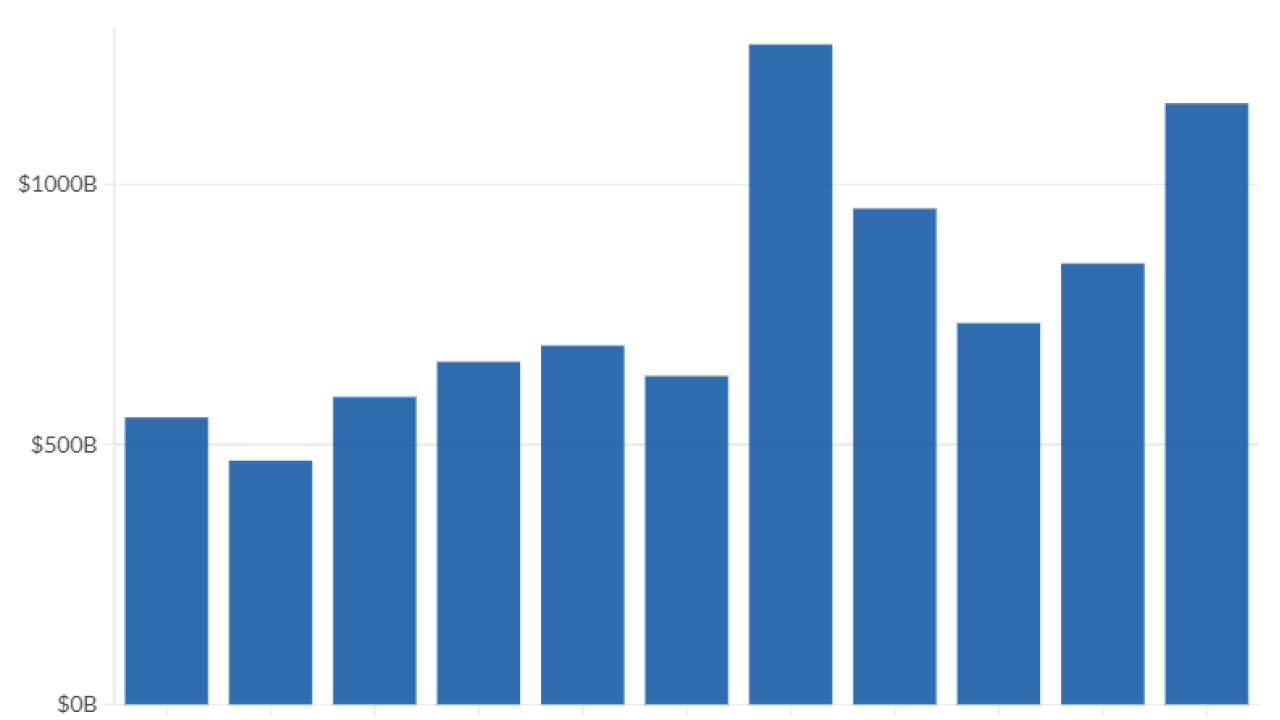The Biden administration has proposed requiring all financial institutions, from Wall Street banks and brokerages to credit unions and private lenders, to report annually to the IRS all of a consumer’s transactions if they total at least $10,000. What would that mean for affluent investors and their financial advisors?
The level was $600 until the Treasury Department raised it to $10,000 early Tuesday afternoon, following an avalanche of criticism that the lower amount would have targeted low-income workers.
Treasury Secretary Janet Yellen said in a
Still, few wealth planners seem aware of how the controversial proposal would work. Here’s what you need to know.
The original

If approved, the requirement would apply to all business and personal accounts at financial institutions, including bank, loan and investment accounts. The IRS, which is overseen by Treasury, wouldn’t see individual transactions, only the total amount deposited and withdrawn annually with a given account.
Yellen's statement said there would be an exception for "wage earners like firefighters and teachers," but didn't explain why or who else was included. A
While the measure isn’t included in the
Last week, in an

The tax gap
The measure is aimed at shoring up what the Treasury Department
Critics had argued that the low $600 threshold would go after shadow economy workers like housekeepers and contractors, not wealthy Americans.
$600 was “a fine-mesh fishing net designed for minnows to catch whales,” argued Jerry Theodorou, the director of the finance, insurance and trade program at the R Street Institute, a nonprofit, free market think tank in Washington, D.C. “It is not clear how the plan will achieve the objective of combating ‘sophisticated evasion’ by collecting information, the vast majority of which is not directed at the plan’s target.”
But President Biden’s budget calls for boosting the IRS’s budget by $80 billion over 10 years to reduce the tax gap and catch cheats. So there’s speculation that the reporting rule would be used to generate data to go after the big fish.
Experts are not entirely convinced it would work.
‘Remains to be seen’
The key element for high net worth investors is the “at least $10,000.” Any amounts higher would fall in the reporting crosshairs.
The measure has prompted howls that it would constitute intrusive government overreach, create data privacy concerns and spawn expensive, record-reporting hassles for banks and account owners. Hemel noted that “millions of Americans will have bank account inflows in excess of gross income — many for entirely legitimate reasons,” such as gifts or the sale of a used car. Likewise, someone who received life insurance death benefits from a deceased parent wouldn’t pay federal income tax on the payouts but would still show the money in their bank account.
Amid the backlash from financial institutions and some conservative pundits, Bloomberg News
Karen Altfest, the executive vice president and principal advisor at Altfest Personal Wealth Management, an independent advisory firm in New York, called the $600 threshold “a low bar” that would “become more meaningful” if raised — which it was on Tuesday.
Bigger fees for consumers?
Mike Palmer, a managing principal at Ark Royal Wealth Management, an independent advisory firm in Raleigh, North Carolina, said that the rule, if approved, “will be enormously onerous for institutions” Palmer, a CFP, added that banks would pass along to consumers the costs of complying. That could mean higher fees on their retirement and brokerage accounts.
Some $163 billion of the estimated $600 billion “tax gap” is attributable to the top 1% wealthiest Americans, a top Treasury tax official, Natasha Sarin,
Fish of all sizes
With the dawn of Side Hustle Nation, as more workers moonlight outside their regular gigs or, like Uber drivers, cobble together projects as self-employed business owners, the IRS is concerned about people who don’t pay the 15.3% Self-Employed Contributions Act tax, or SECA, for Social Security, Medicare and unemployment benefits. But the agency is worried that some high earners in partnerships
Palmer said he assumed the proposed rule “will also apply to Venmo – my adult kids routinely split bills with housemates that exceed this (as do all kids of that generation). Are all those transactions going to be flagged?”
The answer is yes, but not by this proposal. Come 2022, a
Also separately, the bipartisan $1 trillion infrastructure bill has a measure that would
With the reporting threshold, opponents "have exaggerated the extent of the privacy intrusion," Hemel said. "On the other hand, some proponents have exaggerated the utility of the information."
This story has been updated to reflect an announcement by the Biden administration early Tuesday afternoon that the $600 threshold would rise to $10,000.












